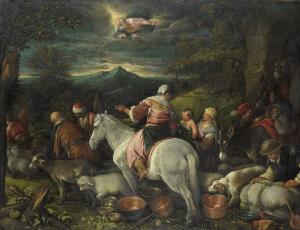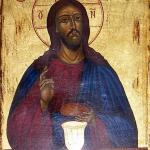 Abraham, the great patriarch and prophet, was called by God to live the life of a migrant:
Abraham, the great patriarch and prophet, was called by God to live the life of a migrant:
Now the LORD said to Abram, “Go from your country and your kindred and your father’s house to the land that I will you. And I will make of you a great nation, and I will bless you, and make your name great, so that you will be a blessing. I will bless those who bless you, and him who curses you I will curse; and by you all the families of the earth shall bless themselves” (Gen. 12:1-3 RSV).
Abraham was told that through him a great nation would arise. But before then, he would be a man on the move. Like many migrants, he would be blessed by some, and cursed by others. He would move from place to place, often with limited or no welcome. Sometimes, he would have to hide his identity, as well as that of his wife, Sarah, such as when he went into Egypt:
Now there was a famine in the land. So Abram went down to Egypt to sojourn there, for the famine was severe in the land. When he was about to enter Egypt, he said to Sarai his wife, “I know that you are a woman beautiful to behold; and when the Egyptians see you, they will say, `This is his wife’; then they will kill me, but they will let you live. Say you are my sister, that it may go well with me because of you, and that my life may be spared on your account” (Gen. 12:10-13 RSV).
Christians, Jews, and Muslims all look to Abraham as an exemplar of the faith. God had called him with a special mission. Through him, monotheism would develop. Through him, the people of Israel would be born. Through him would come the messiah, the savior of the world. He became a close friend of God, a righteous man renowned for his hospitality and mercy (as his desire to save Sodom and Gomorrah demonstrated).
What would we do if we were confronted by an Abraham today, someone who was called by God to wander around as a migrant, to take his family and friends with him, moving from place to place, hiding their identity in places where they felt they would be unwelcome? Would we curse such a person, thereby putting a curse upon ourselves, or would we bless them, show them mercy and grace, helping them in their migration?
But, in reality, should we not all be like Abraham? We want to be called sons and daughters of Abraham, heirs of his promise (through our union with Christ). Should we not imitate him in some fashion or another? St. Ambrose thought so:
If we are the sons of Abraham, let us perform the works of Abraham, so that our works shine before God and before men [Cf. St. Matthew 5:16]. The righteous speak of his works to the King [cf. Psalm 44:2], the sinner hides himself, as Adam desired to hide himself [cf. Genesis 3:8], but could not escape notice. Thus, Abraham obeyed the command, and no delay is mentioned.[1]
What did Ambrose think this meant? It is to put God above all things, and to live out our obligation to God (the obligation of love) over all else:
Therefore, we must put God before all, and neither love for country, nor obligations to parents and children, nor regard for a wife, should recall us from compliance with the Heavenly precepts, because God bestows all these things on us and is well able to preserve what He gives.[2]
When we put nations and boundaries over the dignity of human persons, we have already lost our way; we are no longer doing the works of Abraham, we are no longer following the dictates of Christ. The heavenly precepts are the precepts of love. We are called to love, to show honor and dignity to the other, especially the poor and needy, to be hospitable to those in need while holding no earthy place, no nation or state, no border as having absolute authority over us or others. We can recognize, as Abraham did, the relative authority given to the various nations, but that relative authority ends when it goes against human dignity. Likewise, when some nation or authority goes against the precepts of Christ, no Christian can follow them. Christians must follow God over human law, over human conventions. They must recognize that the call of Christ leads them to see Christ in the needy. They must recognize in the migrant, those who are on the move fleeing great evils, not only someone who bears the image of Christ, but someone who comes to us like Abraham, someone who gives us the opportunity to be blessed according to our treatment of them.
Pope Francis reiterated this by stating:
Among the vulnerable of our time that the international community is called to defend are not only refugees but also migrants. Once again, I appeal to governments to provide assistance to all those forced to emigrate on account of the scourge of poverty and various forms of violence and persecution, as well as natural catastrophes and climatic disturbances, and to facilitate measures aimed at permitting their social integration in the receiving countries. Efforts also need to be made to prevent individuals from being constrained to abandon their families and countries, and to allow them to return safely and with full respect for their dignity and human rights. All human beings long for a better and more prosperous life, and the challenge of migration cannot be met with a mindset of violence and indifference, nor by offering merely partial solutions.[3]
Indeed, by putting on Christ, and joining ourselves with him, we are to see ourselves as pilgrims in the world, as Lumen Gentium indicated:
All the members ought to be molded in the likeness of Him, until Christ be formed in them. For this reason we, who have been made to conform with Him, who have died with Him and risen with Him, are taken up into the mysteries of His life, until we will reign together with Him. On earth, still as pilgrims in a strange land, tracing in trial and in oppression the paths He trod, we are made one with His sufferings like the body is one with the Head, suffering with Him, that with Him we may be glorified.[4]
When we recognize ourselves as pilgrims in the world, we should find ourselves holding more in common with migrants than not. We should not treat nations and boundaries as absolutes, turning them into idols to be defended over and above people and their needs. We must not sacrifice people to these idols, feeding the demonic powers which thrive around them. God does not demand such a sacrifice: this was the lesson Abraham learned with Isaac, and so we must not use God to justify such sacrifices today. Rather, we must recognize ourselves in the migrant, treating them as we would want to be treated by others.
Likewise, then, as Abraham as our exemplar, our status as pilgrims does not mean we can ignore our responsibility to the things of the earth because we seek what is in heaven. As we pray for God’s will be done on earth as it is in heaven, so we find our duty to the world increases as we realize our relative position in it, as Gaudium et Spes stated:
Christians, on pilgrimage toward the heavenly city, should seek and think of these things which are above. This duty in no way decreases, rather it increases, the importance of their obligation to work with all men in the building of a more human world. Indeed, the mystery of the Christian faith furnishes them with an excellent stimulant and aid to fulfill this duty more courageously and especially to uncover the full meaning of this activity, one which gives to human culture its eminent place in the integral vocation of man.[5]
Abraham, the “father” of the faith, was a man on a mission, a man on the move. He was a migrant, moving around from place to place. His life, his deeds, must be remembered. We are called to be like him. To also find ourselves on the move, in a spiritual pilgrimage, with our homeland being the eschatological kingdom of God. Will we reach it? If we are like Abraham, we can. But that means we must be people of great hospitality and charity towards others, including other migrants which we meet on our own path in life.
[IMG Abraham leaves Haran attributed to Francesco Bassano the Younger [Public domain] via WikimediaCommons]
[1] St. Ambrose, On Abraham. Trans. Theodosia Tomkinson (Etna, California: Center For Traditionalist Orthodox Studies, 2000), 3.
[2] St. Ambrose, On Abraham, 6.
[3] Pope Francis’ Address to the Diplomatic Corps. Vatican News (1-07-2019).
[4] Lumen Gentium. Vatican Translation. ¶7.
[5] Gaudium et Spes. Vatican Translation. ¶57.
Stay in touch! Like A Little Bit of Nothing on Facebook












